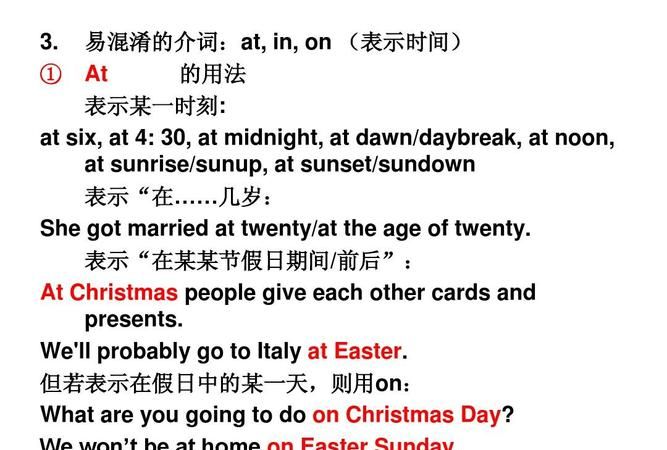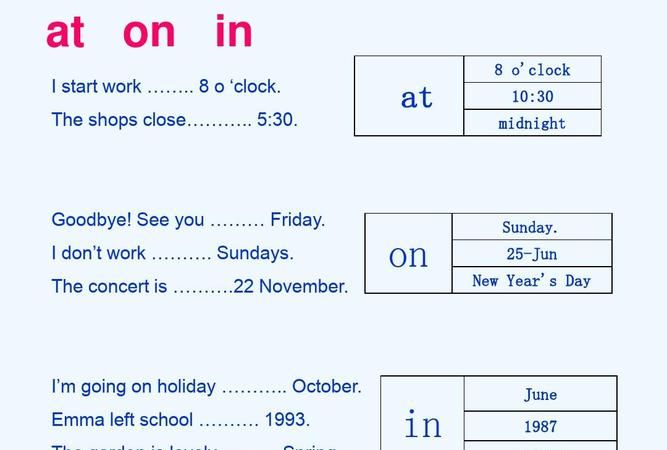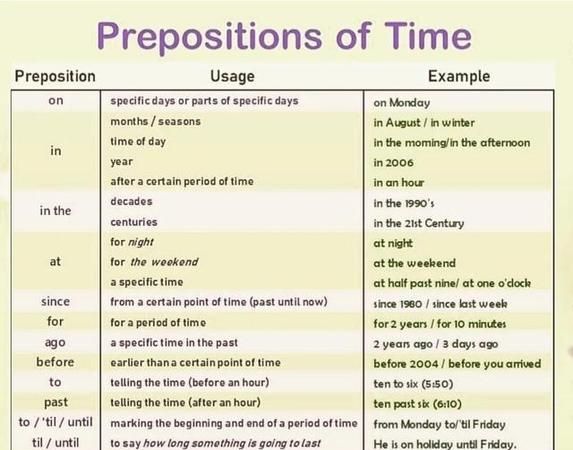本文目录
记英语月份的口诀
建议你可以买本书:<<英语技法大全>>
全部是口诀,很好记的.
MBA英语口诀学语法之巧记时间名词前所用介词
年月周前要用in,日子前面却不行。
遇到几号要用on,上午下午要用in。
要说某日上下午,用on换in才能行。
午夜黄昏要用at,黎明用它也不错。
at也用在准时(准确时间)前,说“差”(差多少分钟)就要用上to,
说“过”(几点过几分)只可使用past,多说多练牢牢记,
莫让岁月空蹉跎。

现代汉语介词口诀
早、午、晚要用in
例:in the morning 在早上
in the afternoon 在下午
in the evening 在晚上
in the day 在白天
at黎明、午、夜、点与分
例: at dawn, at daybreak 在黎明时候
at noon 在中午
at night 在夜间
at midnight 在午夜
以上短语都不用冠词
at six o"clock 在6点钟
at 7:30 (seven thirty) 在7点半
at half past eleven 在11点半
at nine fifteen 在9点15分
at ten thirty a.m. 在上午10点30分
也可以写成
seven to five 5点差7分(半小时以上)
five minutes after two 2点过5分
at a quarter to two 1点45分
at the weekend 在周末
年、月、年月、季节、周
即在“来年”,在“某月”,在“某年某月” (但在某年某月某
日则用on),在四季,在第几周等都要用in。
例;in 1986 在1986年
in 1927 在1927年
in April 在四月
in March 在三月
in December 1986 1986年12月
in July l983 1983年7月
in spring 在春季 in summer 在夏季
in autumn 在秋季 in winter 在冬季
in the fist week of this semester 这学期的第一周
in the third week 在第三周
阳光、灯、影、衣、冒 in,
即在阳光下,在灯下,在树阴下,穿衣、着装、冒雨等都要用in。
例:Don"t read in dim light. 切勿在暗淡的灯光下看书。
They are reviewing their lessons in the bright light. 他们在明亮的灯光下复习功课。
They are sitting in the shade of a tree. 他们坐在树阴下乘凉。
a prisoner in irons 带着镣铐的囚犯
He went in the rain to meet me at the station. 他冒雨到车站去接我。
The poor dressed (clothed) in rags in old society. 旧社会穷人们衣衫褴褛.
以及:in the bright sunlight 在明亮的阳光下
a merchant in disguise 乔装的商人
the woman in white (black, red, yellow) 穿着白(黑、红、黄)色衣服的妇女
in uniform 穿着制服
in mourning 穿着丧服
in brown shoes 穿着棕色鞋
in his shirt sleeves 穿着衬衫
将来时态in...以后
例: They will come back in 10 days. 他们将10天以后回来。
I"ll come round in a day or two. 我一两天就回来。
We"ll be back in no time. 我们一会儿就回来。
Come and see me in two days" time. 两天后来看我。(从现在开始)
after... (从过去开始)
小处at大处in
例:Li and I arrived at Heishan county safe and sound, all is well. Don"t worry. 李和我平安地到达黑山县,一切很好,勿念。
I live in a great city (big city), my sister lives at a small town while my parents live at a village. 我住在大城市,我姐姐住在一个小城镇,而我的父母则住在农村。
I"m in Liaoning, at Anshan. 我住在辽宁省鞍山市.
有形with无形by,语言 、单位、材料in
例:The workers are paving a road with stone. 工人们正用石子铺路。(有形)
The teacher is correcting the paper with a new pen. 这位教师正用一支新笔批改论文。(有形)
"Taking Tiger Mountain by Strategy" is a good opera. <<智取威虎山>>是—出好戏。(无形)
The product is separated by distilation into gasoline and gas oil. 这种产品是用蒸馏分离出气油和粗柴油。 (表示方式、手段、方法——无形)
I really can"t express my idea in English freely in-deed. 我确实不能用英语流利地表达我的思想。 (表示某种语言用in)
I wrote a novel in Russian. 我用俄语写了一本小说。(同上)
The kilometer is the biggest unit of length in the metric system. 公里是米制中最长的长度单位。 (表示度、量、衡单位的用in )
The length is measured in meter, kilometre, and centimetre. 长度是以米、公里、厘米为单位来计算的。(同上)
This board was cast in bronze not in gold. 这个牌匾是铜铸的,不是金铸的。
特征、方面与方式、心情、成语惯用in
特征或状态:
例: The Democratic Party was then in power. 那时民主党执政。
They found the patient in a coma. 他们发现病人处于昏迷状态。
He has not been in good health for some years. 他几年来身体一直不好。
Many who came in despair went away in hope. 许多人带着绝望情绪而来,却满怀希望而去。
The house was in ruins. 这房屋成了废墟。
The poor girl was in tears. 这个贫苦女孩泪流满面。
Her clothes were in rags. 她的衣跟穿破了。
His shoes were in holes. 他的鞋穿出窟窿了。
I only said it in fun. 我说这话只是开玩笑的。
She spoke in grief rather than in anger. 与其说她讲得很气愤,不如说她讲得很伤心。
还有一些短语也用in,如:
in jest 诙谐地,in joke 开玩笑地,in spite 恶意地, in fairness 公正地,in revenge 报复, in mercy 宽大,in sorrow 伤心地等。
His mind was in great confusion. 他脑子里很乱。
Today everybody is in high spirits and no one is in low ebb. 今天大家都兴高采烈,没有一个情绪低落的。
She and her classmates are in flower ages. 她和她的同学都正值妙龄。
The compaign was in full swing. 运动正值高潮中。
方面:
例:we accepted the item in principle. 我们在原则上接受了这个条款。
They are never backward in giving their views. 他们从来不怕发表自己的意见。
The backward area has achieved self-sufficient in grain. 这个落后的地区在粮食方面已能自给。
A good teacher must be an example in study. 一个好的教师必须是学习的模范。
方式:
例:All the speeches were taken down in shorthand. 所有报告都用速记记录下来了。
The Party has always educated us in the spirit of patriotism and internationalism. 党一贯以爱国主义和国际主义精神教育我们。
如下成语惯用in
例如: in all 总计
in advance 事前
in the meantime 与此同时
in place 适当地
in hopes of(或in the hope of) 怀着.......希望
in connection with 和……有关
in contact with 和……联系
in addition to 除......以外
in case of 倘若,万一
in conflict with 和......冲突
in force 有效的,大批
in depth 彻底地
in regard to 关于
in the neighborhood of 大约、邻近
in retrospect 回顾,一想起
in behalf of 代表......利益
in the least 一点,丝毫
in alarm 惊慌、担心
in the opinion of 据……见解
in the long run 从长远说来
in one"s opinion 在……看来
in word 口头上
in a word 总之
in vain 无益地, 白白地
in case 如果,万一,以防
in detail 详细地
in haste 急急忙忙地
in conclusion 总之
in spite of 尽管
in other words... 换句话说
in return 作为回报
in the name of 以......名义
be confident in 对......有信心
be interested in 对......感兴趣
in doubt 怀疑
in love 恋爱中
in debt 负债
in fun (jest、joke) 玩笑地
in hesitation 犹豫不决
in wonder 在惊奇中
in public (secret) 公开他(秘密地)
in a good humour 心情(情绪)好
“介词at、to表方向,攻击、位置、善、恶、分”。
介词at和to都可以表示方向; 用at表示方向时,侧重于攻击的目标,往往表示恶意;用to表示方向时,突出运动的位置或动作的对象,侧重表示善意。试比较下列各句:
1. A.She came at me. 她向我扑过来。
B.She came to me. 她向我走过来。
2.A.Jake ran at John. 杰克向约翰扑过去。
B.Jake ran to John. 杰克朝约翰跑去。
3.A. He rushed at the woman with a sword. 他拿着剑向那妇女扑过去。
B. He rushed to the woman with a sword. 他带着剑向那妇女跑过去。
4.A.He shouted at the old man. 他大声喝斥那老人。
B. He shouted to the old man. 他大声向那老人说
5.A.I heard her muttering at Xiao Li. 我听见她在抱怨小李。
B.I heard her muttering to Xiao Li. 我听见她在同小李低声说话。
6.A. She talked at you just now. 她刚才还说你坏话呢。
B.She talked to you just now. 她刚才还同你谈话呢.
7.A.She threw a bone at the dog. 她用一块骨头砸狗。
B.She threw a bone to the dog. 她把一块骨头扔给狗吃。
8.A.He presented a pistol at me. 他用手枪对着我。
B.He presented a pistol to me. 他赠送我一支手枪。
日子、日期、年月日,星期加上早午晚; 以下皆用on。
例: on Octorber the first 1949 1949年10月1日
on February the thirteenth l893 1893年2月13日
on May the first 5月1日
on the first 1号
on the sixteenth 16号
on the second of January 或 on January the second 1月2日
on a summer evening 在夏天的一个夜晚
on Boxing Day 在节礼日(圣诞节次日)
on New Year"s Day 在元旦
on my birthday 在我的生日
但 in the Christmas holidays在圣诞节假期; in the eighteenth century 在十八世纪; in ancient times 在古代; in earlier times 在早期; in modern times 在现代,则用in,the present time 现在,at the present day当今则用at。
on May Day 在“五·一”节
on winter day 在冬天
on Decenber 12th 1950 l950年12月12日
on Sunday 在星期天
on Monday 在星期一
on Tuesday morning 星期二早晨
on Saturday afternoon 星期六下午
on Friday evening 星期五晚上
但last night 昨夜;in the evening 在晚上; on time准时,in time及时,等则不同。
年月日,加早午晚,of之前on代in
例: on the morning of 18th 18日早晨
on the evening of 4th 4日晚上
On the eve of their departure they gave a farewell banquet and their head gave a garewell speech. 他们在临行前夕举行了一次告别宴会,他们的团长发表了告别讲话。
收音、农场,值日on
例:Did your supervisor like the story over (or on) the radio last night?
您的导师喜欢昨天从收音机里听到的故事吗?
I heard the news over (or on) the radio. 我从收音机里听到了这一条消息。
talk over the radio 由无线电播音
on TV 从电视里......
hear something on the wireless 在无线电里听到
My brother works on an Army reclamation farm. 我哥哥在一个军垦农场工作。
The students are working on a school farm. 学生们正在校办农场劳动。
This is a farmer"s house on a farm. 这是农场的农舍。
Who is on duty, tody? 今天谁值日?
We go on duty at 8 a.m. 我们上午8点钟上班。
关于、基础、靠、著论
例: This afternoon we are going to listen to a report on the international situation. 今天下午我们要听关于国际形势的报告。
Professor Shen will give us a talk on travelling in America. 申教授将给我们做关于美国之行的报告。
You are wrong on all these issues. 在这些问题上你的看法都错了。
The belief is based on practical experience. 这种信念是以实际经验为基础的。
Theory must be based on practice. 理论必须以实践为基础。
The people in the south live on rice. 南方人主食大米。(靠)
The citizens live on their salaries. 城市人靠薪金生活。
You can"t afford luxuries, on an income of 100 yuan a month. 靠月薪100元的收入,你是买不起奢侈品的。
Her pet dogs were fed on the choicest food. 她用精饲料喂养她心爱的狗。
He is just a scrounger, who lives on other people. 他正是一个小偷,专靠损害别人过日子。
Keep the kettle on the boil (=boiling). 让水壶的水一直开着。
The enemy are on the run (=running). 敌人在逃跑。
on后接the加上一个作名词的动词.其意义与现在分词所表达的相近。类似例子很多如:
on the march在行军中,on the mend 在好转中,on the prowl徘徊,on the move活动中,on the scrounge巧取豪夺(埋语),on the go活跃,忙碌,on the lookout注意, 警戒,on the watch监视着。on the hop趁不备抓住某人等等。
on the People"s Democratic Dictatorship<<实践论>>和<<矛盾论>>
on the People"s Democratic Dictatorship<<论人民民主专政>>
"on Coalition Government" <<论联合政府>>
着、罢、出售、偷、公、假,故意、支付,相反、准
注:口诀中的“着”是指着火,罢指罢工,偷指偷偷地,公指出差、办公事;假指休假,准指准时。
例:The house next to mine was on fire. 我邻居的房子着火了。
The workers of the railway station were on strike. 铁路工人罢工了。
Grapes and big water melons from Sinkiang are on sale on a large sale. 新疆葡萄和西瓜大量上市了。
do something on the sly (quiet). 秘密地(暗地里,偷偷地)做某事。
I"ve come here on business. 我是有公事来的。
They went to Bern on a mission. 他们到伯尔尼去执行一项使命。
They has been away on a long trip. 他们出去做一次长途旅行。
I"ll go home on leave next month. 下月我将休假回家。
I went on business to Shanghai. I did not take leave. 我是公出去上海的,不是不告而别。
She came to see you on purpose. 她是专程来看你的。
He came here on purpose to discuss it with you. 他到这来是要与你讨论这件事的。
This lunch is on me.
"No. let"s go Dutch."
“这顿午饭我付钱。”
“不,还是各付各的。”
On the contrary, it was very easy to understand. 相反,这事儿很容易理解。
P1ease come on time. (on schedule). 请准时来。
注:in time是“及时”的意思。
The train arrived on schedule. 火车准时到达。
特定时间和“一……就”,左右on后动名词
例:Gases expand on heating and contract on cooling. 气体加热时膨胀,冷却时收缩。(特定时间)
On entering the room, he found his friends dancing in high spirits. 一进屋,他就发现他的朋友们在愉快地跳舞。
On reaching the city he called up Lao Yang. 一到城里他就给老杨打了一个电话。
I"ll write to him on hearing from you. 我接到你的来信就给他写信。(一……就)
以及on the left, right向左向右,on the stair在台阶上等。
步行、驴、马、玩笑on,cab,carriage用in
例:On foot步行; on horse骑马; on donkey 骑驴。
He rode on, blood flowing from his side. 他骑着马,鲜血从腰部流下来。
The soldier of the Eighth Route Army rode 100 li on a horse a day in order to catch up with his unit. 为赶上部队,那位八路军战士骑马日行百里
希望能帮你。

介词用法口诀速记~in,on,at等等
介词用法口诀
早、午、晚要用in,at黎明、午夜、点与分。
年、月、年月、季节、周,阳光、灯、影、衣、冒in。
将来时态in...以后,小处at大处in。
有形with无形by,语言、单位、材料in。
特征、方面与方式,心情成语惯用in。
介词at和to表方向,攻击、位置、恶、善分。
日子、日期、年月日,星期加上早、午、晚,
收音、农场、值日on,关于、基础、靠、著论。
着、罢、出售、偷、公、假,故意、支付、相反,准。
特定时日和"一……就",on后常接动名词。
年、月、日加早、午、晚,of之前on代in。
步行、驴、马、玩笑on,cab,carriage则用in。
at山脚、门口、在当前,速、温、日落、价、核心。
工具、和、同随with,具有、独立、就、原因。
就……来说宾译主,对、有、方状、表细分。
海、陆、空、车、偶、被by,单数、人类know to man。
this、that、tomorrow,yesterday,next、last、one。
接年、月、季、星期、周,介词省略已习惯。
over、under正上下,above、below则不然,
若与数量词连用,混合使用亦无关。'
beyond超出、无、不能,against靠着,对与反。
besides,except分内外,among之内along沿。
同类比较except,加for异类记心间。
原状because of,、 owing to、 due to表语形容词
under后接修、建中,of、from物、化分。
before、after表一点, ago、later表一段。
before能接完成时,ago过去极有限。
since以来during间,since时态多变换。
与之相比beside,除了last but one。
复不定for、找、价、原,对、给、段、去、为、作、赞。
快到、对、向towards,工、学、军、城、北、上、南。
but for否定用虚拟,复合介词待后言。
ing型由于鉴,除了除外与包合。
之后、关于、在......方面,有关介词须记全。
in内to外表位置,山、水、国界to在前。
如大体掌握如上介调用法口诀,就不易出错。当然,至于介词的详尽用法,同形词又是连词及副词等内容此章不讲。下面对该口诀分别举例帮助你理解消化。
早、午、晚要用in
例:in the morning 在早上
in the afternoon 在下午
in the evening 在晚上
in the day 在白天
at黎明、午、夜、点与分
例: at dawn, at daybreak 在黎明时候
at noon 在中午
at night 在夜间
at midnight 在午夜
以上短语都不用冠词
at six o'clock 在6点钟
at 7:30 (seven thirty) 在7点半
at half past eleven 在11点半
at nine fifteen 在9点15分
at ten thirty a.m. 在上午10点30分
也可以写成
seven to five 5点差7分(半小时以上)
five minutes after two 2点过5分
at a quarter to two 1点45分
at the weekend 在周末
年、月、年月、季节、周
即在"来年",在"某月",在"某年某月" (但在某年某月某
日则用on),在四季,在第几周等都要用in。
例;in 1986 在1986年
in 1927 在1927年
in April 在四月
in March 在三月
in December 1986 1986年12月
in July l983 1983年7月
in spring 在春季 in summer 在夏季
in autumn 在秋季 in winter 在冬季
in the fist week of this semester 这学期的第一周
in the third week 在第三周
阳光、灯、影、衣、冒 in,
即在阳光下,在灯下,在树阴下,穿衣、着装、冒雨等都要用in。
例:Don't read in dim light. 切勿在暗淡的灯光下看书。
They are reviewing their lessons in the bright light. 他们在明亮的灯光下复习功课。
They are sitting in the shade of a tree. 他们坐在树阴下乘凉。
a prisoner in irons 带着镣铐的囚犯
He went in the rain to meet me at the station. 他冒雨到车站去接我。
The poor dressed (clothed) in rags in old society. 旧社会穷人们衣衫褴褛.
以及:in the bright sunlight 在明亮的阳光下
a merchant in disguise 乔装的商人
the woman in white (black, red, yellow) 穿着白(黑、红、黄)色衣服的妇女
in uniform 穿着制服
in mourning 穿着丧服
in brown shoes 穿着棕色鞋
in his shirt sleeves 穿着衬衫
将来时态in...以后
例: They will come back in 10 days. 他们将10天以后回来。
I'll come round in a day or two. 我一两天就回来。
We'll be back in no time. 我们一会儿就回来。
Come and see me in two days' time. 两天后来看我。(从现在开始)
after... (从过去开始)
小处at大处in
例:Li and I arrived at Heishan county safe and sound, all is well. Don't worry. 李和我平安地到达黑山县,一切很好,勿念。
I live in a great city (big city), my sister lives at a small town while my parents live at a village. 我住在大城市,我姐姐住在一个小城镇,而我的父母则住在农村。
I'm in Liaoning, at Anshan. 我住在辽宁省鞍山市.
有形with无形by,语言 、单位、材料in
例:The workers are paving a road with stone. 工人们正用石子铺路。(有形)
The teacher is correcting the paper with a new pen. 这位教师正用一支新笔批改论文。(有形)
"Taking Tiger Mountain by Strategy" is a good opera. <<智取威虎山>>是-出好戏。(无形)
The product is separated by distilation into gasoline and gas oil. 这种产品是用蒸馏分离出气油和粗柴油。 (表示方式、手段、方法--无形)
I really can't express my idea in English freely in-deed. 我确实不能用英语流利地表达我的思想。 (表示某种语言用in)
I wrote a novel in Russian. 我用俄语写了一本小说。(同上)
The kilometer is the biggest unit of length in the metric system. 公里是米制中最长的长度单位。 (表示度、量、衡单位的用in )
The length is measured in meter, kilometre, and centimetre. 长度是以米、公里、厘米为单位来计算的。(同上)
This board was cast in bronze not in gold. 这个牌匾是铜铸的,不是金铸的。
特征、方面与方式、心情、成语惯用in
特征或状态:
例: The Democratic Party was then in power. 那时民主党执政。
They found the patient in a coma. 他们发现病人处于昏迷状态。
He has not been in good health for some years. 他几年来身体一直不好。
Many who came in despair went away in hope. 许多人带着绝望情绪而来,却满怀希望而去。
The house was in ruins. 这房屋成了废墟。
The poor girl was in tears. 这个贫苦女孩泪流满面。
Her clothes were in rags. 她的衣跟穿破了。
His shoes were in holes. 他的鞋穿出窟窿了。
I only said it in fun. 我说这话只是开玩笑的。
She spoke in grief rather than in anger. 与其说她讲得很气愤,不如说她讲得很伤心。
还有一些短语也用in,如:
in jest 诙谐地,in joke 开玩笑地,in spite 恶意地, in fairness 公正地,in revenge 报复, in mercy 宽大,in sorrow 伤心地等。
His mind was in great confusion. 他脑子里很乱。
Today everybody is in high spirits and no one is in low ebb. 今天大家都兴高采烈,没有一个情绪低落的。
She and her classmates are in flower ages. 她和她的同学都正值妙龄。
The compaign was in full swing. 运动正值高潮中。
方面:
例:we accepted the item in principle. 我们在原则上接受了这个条款。
They are never backward in giving their views. 他们从来不怕发表自己的意见。
The backward area has achieved self-sufficient in grain. 这个落后的地区在粮食方面已能自给。
A good teacher must be an example in study. 一个好的教师必须是学习的模范。
方式:
例:All the speeches were taken down in shorthand. 所有报告都用速记记录下来了。

atonin的用法及区别地点
at用法:at+点时间,最小的时间就是几几分
on用法:on+天时间,比点时间大就是哪一天
in用法:in+短时间,最大的时间,是指一个时间段
口诀:at用在时刻前,亦与正午、午夜连,黎明、终止和开端,at与之紧接着相伴。周月季年长时间,in须放在其前面,泛指一晌和傍晚, 也要放在in后边。 on指特定某天,日期、星期和节日前某天上下和夜晚,依然要在on后站。
at、on、in的区别:含义不同、用法不同、侧重点不同。
一、含义不同
1、at
prep. 在;向;达。n. 基普(老挝货币基本单位)(=att);[化]砹(极不稳定放射性元素)。abbr. 密封的(=airtight)。abbr. 气温(=air temperature)
2、on
prep. 在 ... 之上;由 ... 支撑着;在(某一天);关于;基于。adv. 穿着;向前(移动);表示持续性。adj. 表示已连接、处于工作状态或使用中;发生;值班
3、in
adv. 在家;入;进;向里;在某地;并入;在某种关系中。adj. 在里面的;新来的;执政的;<口>时髦的。n. 当权者;影响;达成目标的路径
二、用法不同
1、at
用于地方时,at指较小的地方,如指城镇时。说到某大城市的某大建筑物,往往在大城市名称的前面用at。
The airplane flies at 900 kilometers an hour.
飞机以每小时900公里的速度飞行。

2、on
on表示“在物体的表面上”,表示“手脚上的斑点”时,应用介词on。
The spider is walking on the ceiling.
蜘蛛在天花板上爬行。
3、in
用于地方时,in指较大的地方,用于省、国家、大陆前。在London前通常用in。in表示“在里面”的静止状态或一定范围内的动作。
The telephone was in the little study on the ground floor.
电话在底楼的小书房里。
三、侧重点不同
1、at
作前置词在表示地点或时间时含“在……”之意,at表地点时,指空间位置上的某一点;表时间时,指在时间上的某一时刻。
2、on
作前置词在表示地点或时间时含“在……”之意,on表地点时,指某物与另一物表面相接触,或与某地方接壤等;表时间时,指在某一天或某一天的某个时间,尤指在星期几。
3、in
作前置词在表示地点或时间时含“在……”之意,in表地点时,指在某一立体空间范围内;表时间时,指一段时间或与年、月、季节时间连用。
以上就是关于时间介词顺口溜完整版 ,记英语月份的口诀的全部内容,以及时间介词顺口溜完整版 的相关内容,希望能够帮到您。
